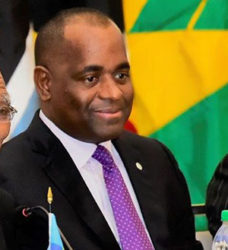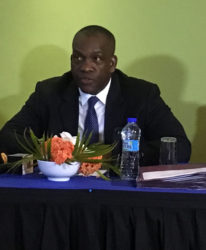Current Chairman of the Conference of Caricom Heads of Government President David Granger yesterday said concerns raised by Dominica’s Opposition Leader about the impact of the alleged mismanagement of the island’s economic citizenship scheme on the region’s security are an “internal matter.”
Opposition Leader Lennox Linton on Thursday called for Caricom to intervene and set up a regulatory commission for the island’s controversial Citizenship by Investment (CBI) programme,

while warning that it currently poses a risk of exposing both his country and the region to transnational crimes.
Linton has also called for an investigation of the programme, under which it has been alleged that Dominica’s diplomatic passports have been sold.
Stabroek News yesterday asked President Granger if Caricom was prepared to respond to Linton’s request for intervention in light of his claims that free movement under the single market and economy might affect the security of every state if the citizenship programme is not properly implemented.
He responded by stating that Caricom has not received a formal request from Linton and he considered the matter an “internal” one.

“I think it would be unwise for me to venture into that area. It is an internal matter affecting the security of a Member State,” Granger said at a press conference, while adding that a report was received from Prime Minister of Dominica Roosevelt Skerrit on recent unrest within the island.
“It is quite likely that what the opposition leader would’ve said would’ve been at variance with that report. It is quite possible the leader of the opposition may not have been describing precisely what occurred in the streets of Rousseau two weeks ago,” he added.
Grenada Prime Minister Keith Mitchell, who will take over Caricom Chairmanship from Granger in July, added that any issue that occurs at the level of the state in Caricom must be settled within that particular local situation.
He noted that all Caricom requires is that whatever disputes exist, resolution must be done peacefully. He added that if both sides were to require the input of Caricom, it would be prepared to “play that role.”
He reminded that as one of the older heads present at the 28th intercessional meeting, he remembered being in Guyana to negotiate a settlement after unrest which followed the 1997 general and regional elections.
“I was in Guyana and I led consultation between the forces of government and opposition. Caricom came in to meet with both sides of the coin,” Mitchell, who was chair of Caricom at that time, reminded.
After consultation with the then ruling People’s Progressive Party/Civic and the opposition People’s National Congress (PNC), Mitchell had established the Commission which negotiated the Herdmanston Accord.
President Granger, who now leads the PNCR, had as opposition leader called on Caricom to intervene after then President Donald Ramotar prorogued Parliament in 2014.
At the time, Granger urged that an emergency meeting of Heads of Government of Caricom be convened “to consider a collective approach to the governance crisis in Guyana.”
In a letter to Caricom Secretary-General Irwin La Rocque, he said that Guyana had been plunged into a grave constitutional and political crisis that “if allowed to fester, can expose our people to serious disorder.”
Linton has said the establishment of the Caricom regulatory commission was needed to protect the integrity of Caricom citizenship and to secure Caricom’s commitment to global security arrangements for prevention of money laundering, terrorism and other crimes against humanity. He told a news conference on Thursday that Caricom Heads are “duty bound” to intervene in Dominica since the current administration cannot be left “to bungle its way through these serious issues for which it accepts no responsibility notwithstanding the grave dangers they pose for the integrity of Caricom citizenship and the security of the grouping in these harrowing times of drug trafficking, money laundering, terrorism and other crimes against human civilization.”




